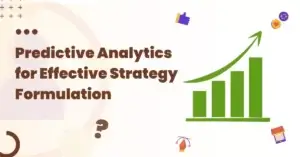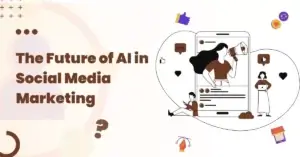In today’s digital age, social media has become a crucial platform for businesses to connect with their target audiences. However, with the ever-increasing volume of data and the complexity of consumer behavior, marketers face significant challenges in effectively reaching and engaging their target audience.
This is where Artificial Intelligence (AI) comes into play. AI is revolutionizing social media marketing by providing marketers with valuable insights and tools to streamline their strategies, personalize their campaigns, and optimize their overall marketing efforts. In this article, we will explore the advantages of using AI in social media marketing and how it is reshaping the future of marketing.
Table of Contents
Understanding the Role of Artificial Intelligence (AI) in Social Media Marketing
AI is a branch of computer science that focuses on developing intelligent machines capable of performing tasks that typically require human intelligence. In social media marketing, AI harnesses the power of machine learning, predictive analytics, and natural language processing to automate processes, gain valuable insights, and enhance overall marketing effectiveness.
Read More – 10 Help of AI in Social Media Marketing You Should Know in 2023
Read More – Growth Your Twitter 10x Faster
A Glimpse into the Future of Marketing

As technology continues to advance, the future of marketing will see a deeper integration of AI into various aspects of social media marketing. From refining audience targeting and personalization to boosting advertising performance and managing social media reputation, AI-powered solutions will play a vital role in driving marketing success. Let’s explore some of the key advantages of using AI in social media marketing:
I. Enhancing Audience Targeting and Personalization
One of the significant advantages AI brings to social media marketing is its ability to enhance audience targeting and personalization. By leveraging AI-driven insights, marketers gain a deeper understanding of audience preferences, allowing them to tailor their marketing efforts for maximum impact.
Leveraging AI-driven Insights to Understand Audience Preferences: AI-powered algorithms analyze vast amounts of data collected from social media platforms, enabling marketers to gain actionable insights into consumer behavior, interests, and preferences. With this valuable information, marketers can optimize their targeting strategy and refine their messaging to resonate better with their target audience.
Creating Hyper-personalized Marketing Campaigns: With AI, marketers can now create hyper-personalized marketing campaigns that speak directly to individual consumers. By analyzing data on an individual level, AI algorithms can generate tailored content, offers, and recommendations, thereby enhancing customer experience and engagement.
Using AI to Optimize Customer Segmentation Strategies: AI technology empowers marketers to identify key customer segments within their target audience more accurately. By analyzing characteristics and behaviors, AI algorithms can segment audiences more effectively, helping marketers tailor their marketing messages and offerings to each specific segment.
II. Streamlining Content Creation and Curation
Creating engaging content consistently is a challenge faced by many marketers. AI-powered tools can automate and streamline the content creation and curation process, saving time and resources.
AI-powered Tools for Generating Engaging Content: With AI, marketers can tap into tools that automatically generate content based on predefined criteria. These tools utilize machine learning algorithms to analyze vast amounts of text, images, and videos, enabling marketers to quickly create compelling and relevant content with minimal effort.
Automating Content Curation with AI Algorithms: AI algorithms can scan and analyze vast amounts of content across various online platforms to identify relevant and trending topics. With this information, marketers can curate content that resonates with their target audience, thereby saving time and effort in content discovery.
Enhancing Content Optimization through Machine Learning: AI-powered tools can analyze content performance data, user feedback, and engagement metrics to optimize content strategies. By leveraging machine learning algorithms, marketers can make data-driven decisions to improve content quality, relevance, and overall effectiveness.
III. Boosting Social Media Advertising
With the dynamic nature of social media advertising, AI plays a pivotal role in maximizing ad campaign success and ensuring optimal performance.
Maximizing Ad Campaign Success with AI-powered Algorithms: AI algorithms can analyze vast amounts of data, including user behavior, interests, and demographics, to predict the likelihood of campaign success. By leveraging these insights, marketers can make data-driven decisions to optimize ad targeting, bidding, and creative messaging, resulting in higher conversion rates and ROI.
Predicting and Analyzing Trends for Enhanced Advertising Strategies: AI tools can predict and analyze emerging trends that can influence social media advertising strategies. By identifying these trends, marketers can proactively adjust their ad campaigns to capitalize on new opportunities and stay ahead of the competition.
Automating Ad Creative Generation and Optimization: AI technology enables marketers to automate the creative generation process by analyzing historical data and user preferences. By leveraging AI-driven algorithms, marketers can optimize ad creative, design, and messaging to enhance engagement and overall ad performance.
IV. Improving Customer Service and Experience
Delivering exceptional customer service and personalized experiences is essential for building brand loyalty. AI plays a vital role in improving customer service and experience on social media platforms.
Implementing AI Chatbots for Instant Customer Support: AI-powered chatbots can provide instant and personalized customer support on social media platforms. These chatbots use natural language processing and machine learning algorithms to understand customer inquiries and provide relevant and helpful responses, ensuring a seamless customer experience.
Harnessing AI to Offer Real-time Customer Recommendations: AI algorithms analyze customer behavior and preferences to provide real-time product recommendations based on their interests and past interactions. This level of personalization enhances customer satisfaction and increases the chances of conversion.
Enhancing Customer Satisfaction through AI-based Sentiment Analysis: AI-based sentiment analysis enables marketers to monitor and analyze social media conversations surrounding their brand, products, or services. By identifying sentiment trends, marketers can proactively address any negative sentiment and amplify positive sentiment, ultimately improving customer satisfaction and brand perception.
V. Monitoring and Managing Social Media Performance
Keeping a close eye on social media performance is crucial for measuring the success of marketing efforts. AI analytics tools enable marketers to gain valuable insights into their social media presence, engagement, and reputation.
Utilizing AI Analytics Tools for In-depth Social Media Insights: AI-driven analytics tools can analyze vast amounts of social media data, such as engagement metrics, audience demographics, and sentiment analysis, to provide marketers with deep insights into their social media performance. This information helps marketers identify areas of improvement, understand audience behavior, and refine their marketing strategies.
Improving Social Listening Practices with AI-based Sentiment Analysis: AI-powered sentiment analysis tools can monitor social media conversations and identify emerging sentiments around a brand or product. This real-time monitoring allows marketers to stay ahead of potential crises, address customer concerns promptly, and capitalize on positive sentiment opportunities.
Monitoring Brand Reputation and Crisis Management through AI: AI technology aids in monitoring brand reputation by analyzing social media conversations, news articles, and online reviews. This enables marketers to respond proactively to any negative mentions, mitigate potential crises, and maintain a positive brand image.
VI. Predictive Analytics for Effective Strategy Formulation

Predictive analytics powered by AI provides marketers with the ability to analyze big data and predict market trends. This empowers marketers to make data-driven decisions, formulate effective strategies, and identify new business opportunities.
Utilizing AI to Analyze Big Data and Predict Market Trends: AI algorithms can analyze vast amounts of data, including social media conversations, online behavior, and industry trends, to identify patterns and predict market trends. This valuable insight helps marketers make informed decisions and stay ahead of market shifts.
Generating Accurate Forecasts for Effective Strategy Development: By leveraging predictive algorithms, marketers can generate accurate forecasts related to market demand, customer preferences, and competitive landscape. This enables marketers to develop effective strategies, optimize resource allocation, and maximize the return on marketing investments.
AI-driven Insights for Identifying New Business Opportunities: AI technology can analyze market data and consumer behavior to identify untapped market segments, emerging trends, and new business opportunities. By leveraging these insights, marketers can innovate, expand their reach, and stay one step ahead of their competitors.
VII. Integrating AI and Influencer Marketing
Influencer marketing has become a powerful strategy for brands to amplify their reach and engage with their target audience. AI can enhance influencer marketing efforts by identifying relevant influencers, automating collaboration, and analyzing the impact of influencer campaigns.
AI-powered Tools for Identifying Relevant Influencers: AI algorithms can analyze social media data to identify influencers who align with a brand’s target audience, values, and goals. By considering factors such as reach, engagement, and topical relevance, marketers can identify influencers most likely to drive impactful results.
Automating Influencer Outreach and Collaboration: AI can automate the influencer outreach and collaboration process, saving marketers time and effort. From identifying suitable influencers to managing communication and campaign logistics, AI-powered tools streamline the entire process while maintaining authenticity and relevance.
Analyzing Influencer Impact and ROI through AI Analytics: AI analytics tools enable marketers to measure the impact and ROI of influencer campaigns. By analyzing engagement metrics, conversion rates, and sentiment analysis, marketers can evaluate the effectiveness of their influencer partnerships and make data-driven decisions for future collaborations.
VIII. Ensuring Data Privacy and Security
With the increasing reliance on data-driven marketing strategies, ensuring data privacy and security is of utmost importance. AI plays a crucial role in addressing concerns related to user data privacy and implementing ethical practices.
Addressing Concerns: AI and User Data Privacy: AI technology can be utilized to implement robust data privacy measures, such as anonymization and secure data storage. By leveraging AI algorithms, marketers can ensure compliance with data protection regulations and build trust with their customers regarding data privacy.
Implementing Ethical AI Practices in Social Media Marketing: Ethical considerations are paramount when utilizing AI in social media marketing. Marketers must ensure transparency, fairness, and accountability in the use of AI algorithms to avoid potential biases, discrimination, or manipulation of user data.
Protecting User Data with AI-driven Security Measures: AI can enhance data security by utilizing advanced algorithms to identify and mitigate potential security breaches. By constantly monitoring and analyzing user data patterns, AI algorithms can detect suspicious activities and protect user information from unauthorized access.
IX. Overcoming Challenges and Limitations
While AI offers immense benefits, there are also challenges and limitations that marketers must navigate to effectively implement AI in social media marketing.

Considerations for Implementing AI in Social Media Marketing: Marketers need to consider various factors, such as budget constraints, technical expertise, and integration challenges when implementing AI in social media marketing strategies. It is essential to evaluate the feasibility and cost-effectiveness of AI solutions and ensure alignment with overall marketing goals.
Addressing Potential Bias and Algorithmic Discrimination: AI algorithms are only as fair and unbiased as the data they are trained on. Marketers must carefully evaluate and mitigate potential biases in AI algorithms to avoid discrimination or exclusion of certain segments of the target audience.
Balancing Human Creativity with AI Automation: While AI can automate numerous tasks, it is crucial to strike a balance between human creativity and AI automation. Marketers should leverage AI as a tool to enhance creativity and efficiency rather than replace human creativity entirely.
X. The Future of AI in Social Media Marketing
AI-driven technologies will continue to evolve and redefine the landscape of social media marketing. The future holds exciting possibilities for marketers to leverage AI in innovative ways.

Evolving AI Technologies and their Impact on Social Media Marketing: Advancements in AI technologies, such as natural language processing, image recognition, and predictive analytics, will enable marketers to tap into new opportunities for engaging with their target audience and delivering personalized experiences.
Predictions for AI-driven Innovations in the Coming Years: In the future, we can expect AI to further automate marketing processes, enhance data analytics capabilities, and enable more sophisticated personalization. AI-powered virtual assistants, voice recognition technology, and augmented reality are some of the innovations that will revolutionize social media marketing.
Advantages and Disadvantages of Using AI in Social Media Marketing
| Advantages | Disadvantages |
|---|---|
| AI can pose ethical and privacy issues, as it may use sensitive or personal data without user consent. | AI can misinterpret the context or tone of the content and generate wrong responses. |
| AI can automate tasks, such as scheduling posts, sending emails, and responding to inquiries, saving time and resources. | AI can analyze data and provide insights into customer behavior, trends, and opportunities. |
| AI can help you improve customer service and satisfaction by providing quick and accurate responses to their queries and feedback. | AI can reduce the human touch and creativity that are essential for social media marketing, as it may not capture the emotions and nuances of human communication. |
| AI can help you identify new opportunities and generate new ideas for your social media marketing. | AI can increase the competition and raise the expectations of your customers. You will need to keep up with the latest technologies and innovations to stand out. |
| AI can help you improve customer service and satisfaction by providing quick and accurate responses to their queries and feedback. | AI can create challenges for human interaction and collaboration. You will need to ensure that your human employees are engaged and motivated. You will also need to foster a culture of trust and transparency between your human and AI teams. |
Summary
AI holds immense potential in transforming social media marketing, offering numerous advantages across various marketing aspects. From enhancing audience targeting and personalization to streamlining content creation and curation, AI empowers marketers to optimize their strategies, drive engagement, and achieve better overall marketing results.
Additionally, AI brings improvements to customer service and experience, social media performance monitoring, strategy formulation, influencer marketing, data privacy and security, and overcoming challenges. Looking ahead, the future of AI in social media marketing is promising, with further advancements and innovations set to reshape the marketing landscape.


Leave a Reply